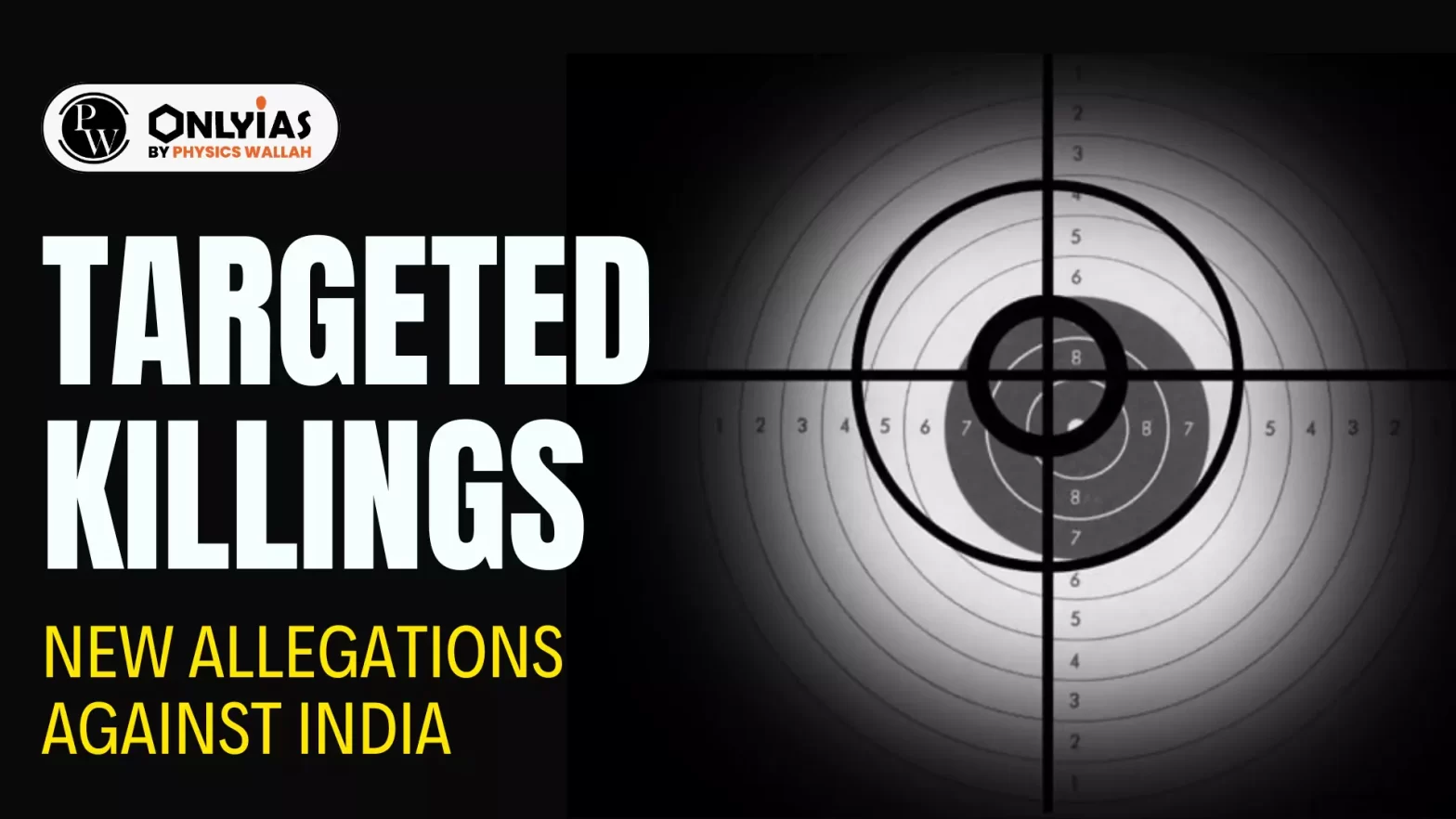Context
Recently, The Guardian stated that the Indian government had killed about 20 people in Pakistan since 2020 as part of a broader plan to eliminate terrorists on foreign soil.
Understanding Targeted Killings: Legal Ambiguity and Conventional Factors
- Absence of Clear Legal Definition: There is no clear, legal definition in international law of targeted killings.
- Consideration of International Terrorist Designation: The first point of consideration is whether the individual is internationally designated as a terrorist under the United Nations Security Council (UNSC) designation list.
- Whether it is difficult to get hold of this person, get them extradited, or bring them to face judicial proceedings.
- Whether it is felt that the person continues to remain engaged in terrorist activity.
Enroll now for UPSC Online Course
- Rationale for Pre-emptive Use of Lethal Force: The state may feel that it is preferable to use lethal force in a pre-emptive fashion in a precise manner so that it does not cause collateral damage.
- Evaluation of Osama bin Laden’s Killing by the U.S: The U.S.’s killing of bin Laden would probably fall into that category of targeted killings because he ticked all these boxes.
- Impact of Meeting Criteria on International Reaction: There are plenty of instances where when these three conditions were met, there was less of an international hue and cry, and when they were not met, there was more of it.
- Double Standards in Targeted Killings: There are massive double standards. Targeted killings came post-9/11.
- The United States used drone strikes and every kind of attack all over the globe and not limited to Afghanistan.
- Global Scope of U.S. Counterterrorism Operations: U.S. President George Bush’s call to the world was that the U.S will attack terrorists wherever they are because it’s self-defense. The underlying criterion for any such attack is self-defense.
- UN Charter and the Right to Individual Self-Defence: The UN allows the right to Self defense. Article 51 of the UN Charter speaks of the right of individual self-defence.
Legality of Targeted Killings under International Law
- Criterion of Proportionate Force in Targeted Killings: One criterion is that it should be proportionate force.
- Responsibility of the State for Armed Attacks:The state is either responsible for the armed attack or is unwilling or unable to stop armed attacks.
- Persistent Conflict Dynamics between India and Pakistan:India is in a state of continuous conflict with Pakistan: attacks keep taking place
- India’s Engagement at the United Nations: [India] have raised the issue at the UN, these people are part of India’s list of terrorists. India has gone through the judicial process within its own country, and it is also sanctioned by the UN.
Evaluation of Three Criteria
- Recognition of Terrorist Designation: The terrorists may be in India’s list, but they are not accepted internationally as terrorists.
- Challenges in Extradition Proceedings: There is no prospect of getting the terrorists extradited to come and face judicial proceedings.
- Legal and Political Context of Conflict: India might argue that it is engaged in a conflict with Pakistan. While the legal validity of such a claim is uncertain, from a political standpoint, it could be asserted.
- However, it’s important to note that there is no formal state of conflict, either legally or politically, between India and Canada or the United States.
- Assessment of Immediate Threat: The principles of self-defense and preemption suggest the existence of an ongoing and imminent threat. Therefore, the question arises: Did Gurpatwant Singh Pannun pose an immediate threat? This determination relies on an intelligence assessment.
Bilateral Dynamics and Political Influence
- Influence of Bilateral Relationships: The differential treatment of nations engaging in targeted killings can be attributed to bilateral relationships and geopolitical dynamics.
- Alliance between Israel and the United States:The close alliance between Israel and the United States, with the latter providing support and backing for Israeli actions.
- Role of the United States as a Permanent UNSC Member: As a permanent member of the UN Security Council (UNSC), the United States wields significant influence, potentially shielding itself and its allies from international scrutiny.
- Political Considerations in Canada’s Case: The involvement of domestic politics likely influenced Canada’s handling of the situation.
- Impact of Justin Trudeau’s Intervention: Prime Minister Justin Trudeau’s public mention of the issue may have compelled the United States to address it more openly, despite a preference for a quieter resolution.
- Subdued Response from the U.S.: Despite being pushed into addressing the issue, the United States has refrained from employing threatening language. They have expressed dissatisfaction, but without escalation.
- Recognition of Double Standards: While acknowledging the presence of double standards, it is generally understood that attacks are not carried out within the territories of allied nations.
Enroll now for UPSC Online Classes
Conclusion
There is a need for enhanced strategic messaging and public relations efforts to safeguard international reputation and navigate complex political landscapes. Effective communication and engagement with multiple stakeholders are crucial in addressing criticisms and preserving diplomatic relationships.
Also Read: Ineffectiveness of the UN Security Council in Conflict Resolution
![]() 19 Apr 2024
19 Apr 2024
